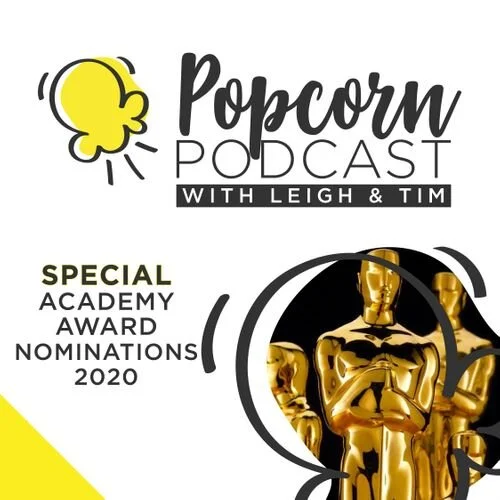A Beautiful Day in the Neighbourhood + Underwater
Leigh and Tim learn the art of patience with A Beautiful Day in the Neighbourhood and dive into deep-sea thriller Underwater. Plus, there's tea spilled in the new Matrix movie, new buzzword sidequel doesn't sit well with Tim and why Leigh is begging Disney to stop doing this one thing.
Listen to the full episode above and follow Popcorn Podcast on your preferred podcast platform for more
A BEAUTIFUL DAY IN THE NEIGHBOURHOOD MOVIE REVIEW
Leigh: Welcome back to another episode of Popcorn Podcast, season three. In this episode we’re talking A Beautiful Day in the Neighbourhood and Underwater, plus all the latest news and trailers.
Tim: The podcast is coming to you from my bedroom floor today and we've got a bit of a pillow fort going here.
Leigh: Comfy! We went and saw A Beautiful Day in the Neighbourhood, which is out in cinemas now. And it's based on the real friendship between a journalist and children's entertainer, Mr. Rogers. Now, Australians might not be familiar with him, but he was quite well known in America.
Tim: A very, very popular and famous, and well-loved TV entertainer. Did you know of him before you went in to watch this film?
Leigh: I had heard of him a bit because you get a lot of references in movies and things, but Australians don't really know what those references mean. It's interesting, this story was inspired by an Esquire magazine article the journalist wrote. The gentleman's name is Tom Junod, but in the movie they changed his name to Lloyd Vogel.
The title of the article was called Can you say… hero? and, unfortunately, in this day and age, I was waiting for some big reveal where Mr Rogers is not really as great as what you think he is. But really, he was just delightful.
Tim: He was! He was delightful as a character and as a person, played brilliantly by Tom Hanks. It was a nice story. It didn't really have a lot going for it, but it wasn't trying to, it was just following the story of this journalist who was quite a broken man.
His article on Mr Rogers was originally meant to be just a 400-word piece on heroes, that's what he was tasked to do. But Lloyd is an investigative journalist, so his editor says: “Can you go off and do this?” And he was not on board. He was looking for the dirt.
No spoilers, but he found no dirt. There is no dirt on this man. What he got out of this experience interviewing him was he uncovered a real gentle soul and Mr Rogers opened the curtain into how he treated people and how he operated.
Mr Rogers was about helping children through difficult things: how to deal with their emotions, talking about divorce, talking about loss or uncomfortable topics and, no matter what their age, his show offered that sort of therapy to kids.
Leigh: It was pioneering for the time, in the 70s, I believe. He’s quite forward thinking and the show was groundbreaking. Also, the journalist got a new perspective on life at the end of it.
This movie is quite simple. As you said Tim, the pacing was a little slow. But I think it asks for a little bit of patience from the audience, which is very in keeping with what Mr Rogers was all about, you know? A little patience, a little kindness, a little tolerance towards other human beings. I think that's what the movie is asking from you too. It's like, bear with us, come back to a simpler time before online cancelling and social media and tearing people down. It was actually quite nice.
Tim: That's such a beautiful way to explain this film and what it was trying to achieve. It was asking for peace. Even just the way Mr Rogers communicates is very slow and discerned. He knows exactly what he's about to say, but he wants to be given the opportunity to say it in the time that he needs. Every word is very well thought out and he wants to get to know you. You're the only person in the room. In the film he says: “When I look down the camera, I'm looking at one child.” That’s how he communicated with people in his real life.
Leigh: That's how they portrayed the narrative of the film too. They've done it in an interesting way. It's like you're watching the Mr Rogers show. It's very clever and it’s surprising.
Tim: I loved that they took you into the studio and you watched him filming scenes.
Leigh: We are Mr Rogers’ audience. Part of the show and part of the movie. I want to point out that the movie was directed by actress and writer Marielle Heller, who wrote and directed Diary of a Teenage Girl. I think she did a really nice job of it. She took some interesting risks.
Tim: One of the biggest quirks of this film, which threw me at first because I thought, ‘oh, gosh, what have we signed up for here?’ was when you have establishing shots in films of cityscapes and cars driving, you know? Well, they chose to do it like what you would see in a Mr Rogers TV show, using models of the city and the cars and I thought that was a nice quirk. It then made you break down your barriers as an adult and step into the magic of him and his program. You feel like a kid again. And it didn't turn the production values down, because I imagine that would have been quite challenging to film and pull off. It was nice that they chose to use that production design to bridge those gaps in the scenes.
Leigh: Absolutely. It was really cute. What would you give this out of five popcorn kernels?
Tim: Look, I think just because you've mentioned it again, I think the pacing was probably its biggest downfall. The article that the journalist ended up writing was 10,000 words, and I thought surely there's more in those words that could have been brought into the story?
Leigh: Absolutely.
Tim: It was a bit light in terms of plot points and content. But if it was any snappier, the film would have been too short, I think. But a beautiful performance by Tom Hanks, who is nominated for an Academy Award for Best Supporting Actor.
I give it three-and-a-half. I liked it enough.
Leigh: I'm going to agree with you there.
Tim: Woah, what's happened? A Beautiful Day in the Neighbourhood, go and check it out.
UNDERWATER MOVIE REVIEW
Leigh: We also saw underwater this week, starring Kristen Stewart, TJ Miller, Vincent Cassel, among others, directed by William Eubank. It's about a crew of aquatic researchers who have to fight to get to the surface when their laboratory is destroyed by an earthquake – or what they think is an earthquake! There's something else lurking down there below with them. This is a standard sci-fi thriller… but I thought it was a mess.
Tim: Oh?!
Leigh: Okay, now I know we're going to disagree on this one…
Tim: Hold that thought because I'm literally the opposite. I mean, there are things that I think they could have done way better or removed, but I was so surprised by how on the edge of my seat I was and how tense I was. I had my hands over my face! But I'm a bit like that.
Leigh: I'll agree with you there. It was very tense; the horror aspects and the jump scares were incredible. It did a really great job there. But I think it was very derivative of a lot of different films.
Tim: For sure. It pulled a lot of inspiration…
Leigh: I don't know what kind of movie it was trying to be? Was it trying to be a psychological thriller? Was it trying to be Alien, which was a heavy influence. Was it trying to be Gravity? Was it trying to be Predator or Godzilla? They pulled so many elements, and it's not that they pulled inspiration, to me it was like they'd cut and pasted all these different elements of these movies into one giant mess. I mean, the story wasn't strong enough, right? They're trying to make this philosophical point about how humans shouldn't mess with what they don't know. And we shouldn't drill beneath the ocean and destroy our earth because it's going to come back and bite us in the arse. But then didn't go into that much. Then it became just a pure monster film. They didn't really go into that too much either. You know what I mean? They just touched on all these different points and all these different movies and it was just a mish-mash.
Tim: I completely hear you on all those points. You are right, I'm not going to say you're wrong. I’m looking at it through the lens of how successfully they pulled off all these amazing set pieces underwater. From a production point of view, it was really, really tight. The costume design of the big outfits when they're going under the water looked really, really cool. I also thought Kristen Stewart delivered a really engaging performance. But I agree that they didn't really have a key focus on exactly what sort of story they were trying to tell. And I'm going to say this, I thought they could have removed the monster element from the film altogether. There was enough tension in the human story. There was enough at stake if it was just an earthquake and they're trying to get out of there. But I guess they added that extra element of making it a monster movie.
Leigh: This is the problem! They're trying to stuff too many elements in there. And they didn't give any of them enough time to breathe, or to be explored…
Tim: To breathe, really? Underwater [laughs]…
Leigh: Also, the casting. They’re all great, well, not all of them are great actors, but most of them are great actors singularly. Kristen Stewart did deliver an incredible performance. Absolutely. Vincent Cassel was great too. He was excellent, fantastic. TJ Miller is really irritating, but I'm not going to go too much into that.
Tim: I warmed to him. He was really irritating at the beginning, but I kind of warmed to him towards the end.
Leigh: But, again, his comedy elements just felt really shoe-horned in. I couldn't even understand some of the stuff he was saying sometimes, they were just real throwaway comments. All these cast members singularly do a good job, but it felt like a weird mix. Did you feel it?
Tim: Yeah, I did. It was a bit odd. Some of the things they were dealing with being in a situation where they didn't have any control over some of those decisions or dialogue from certain characters was a bit left of centre.
Leigh: They also set some things up, but didn't then go back? Like, the captain was having some mental problems?
Tim: Yeah, that's right…
Leigh: Then they never ever touched on it again. I was expecting him to screw them over.
Tim: As you said, they dipped their finger in so many different pies. But I still had such a good time. I agree with all those story points, but it was so much fun. It was brilliant.
What’s interesting, looking into the production of this film – and I don’t know whether this had a hand in it being a bit of a jumble – they filmed this back in 2017. So it's been waiting to be released for more than three years. Because of the Disney acquisition of Fox, it was trying to find its slate. It’s been ready to go for probably two years or so, and I wonder if it was too random to throw it into the cinemas in January. I guess they just needed to get it out there to make some money back, but I'm glad it came out because I actually enjoyed it a lot.
Leigh: How many popcorn kernels would you give?
Tim: I really want to know how many you're going to give it, but I'm going to give it three.
Leigh: I'm only giving it a two.
Tim: Ooooh, okay, fair enough. All your points are so valid but I might just be in a better mood this morning.
Leigh: Hey!
Tim: I'm sorry! [laughs] Not in comparison to you but because I can be insanely critical on all those things you've brought up.





